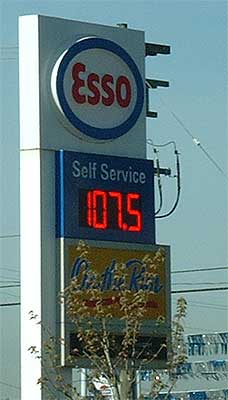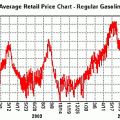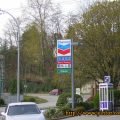
During last 12 months, fuel price increased much more.
There is the latest release from consumer price index report from Statistics Canada on Friday, April 22, 2005.
Consumers paid 2.3% more in March than the same month a year earlier for the goods and services included in the Consumer Price Index (CPI) basket. This increase followed a 12-month rise of 2.1% in February.
For the 11th consecutive month, gasoline prices remain the main factor of the 12-month increase in the CPI
See below:
The energy index climbed 9.5% between March 2004 and March 2005, mainly as a result of higher gasoline prices (+11.2%). Higher prices for fuel oil (+25.8%), natural gas (+10.3%), electricity (+3.4%), as well as for fuel, parts and supplies for recreational vehicles (+7.6%) also contributed to pushing up the energy index.
Fuel Saving Tips is more important than that before.
Seven easy things you can do to save gas–and money–today.
To review it in the future, paste it following:
No loitering. Don’t let the engine run at idle any longer than necessary. After starting the car in the morning, begin driving right away; don’t let it sit and “warm up” for several minutes. An engine actually warms up faster while driving. With most gasoline engines, it’s more efficient to turn off the engine than to idle for any longer than 30 seconds.
Easy does it. Driving smoothly and steadily makes the best use of your fuel. If you can, avoid hard acceleration or braking. Once up to speed, maintain a steady pace in top gear. Varying your speed a lot wastes fuel. A vehicle’s gas mileage decreases rapidly at speeds above 60 mph. Smooth acceleration, cornering, and braking not only save fuel but also extend the life of the engine, transmission, brakes, and tires.
It’s a drag. At highway speeds, more than 50 percent of engine power goes to overcoming aerodynamic drag. Try not to add to the drag by carrying things on top of your vehicle. A loaded roof rack can decrease a car’s fuel efficiency by 5 percent. Even driving with empty ski racks wastes gas. In addition, if you have air conditioning, use it only when you really need it. Running the air conditioner robs power from the engine and uses additional fuel.
Stay warm. An engine runs most inefficiently when it’s cold. It not only uses more fuel but also creates the most exhaust emissions and suffers the most wear. Avoid many short, separate trips–and unnecessary cold starts–by combining as many errands as possible into one trip.
Getting regular. If your car specifies regular fuel, don’t buy premium under the mistaken belief that your engine will benefit. Most cars are designed to run just fine on regular gasoline. Furthermore, many cars that recommend premium fuel also run well on regular. Check your owner’s manual to find out if your engine is designed to handle either grade. And consider buying off-brand gasoline, which is most often identical to what is sold at franchised gas stations.
Watch the tires. Keep your tires properly inflated. Underinflated tires require more energy to roll, which not only wastes fuel but also wears the tires faster. According to the EPA, a tire that is underinflated by only 2 pounds per square inch can cause a 1 percent increase in fuel consumption. Underinflated tires can also build up excess heat, which can lead to tire failure. Check your vehicle’s tire pressures at least once a month, when the tires are cold. Also, check the tires before and after long road trips. The recommended tire pressure is found on a label inside the car–usually in a door jamb or inside the glove-box lid.
Stay tuned. The fuel consumption that’s posted on new-car window stickers is based on a well-tuned and properly maintained vehicle. Running a car in subpar mechanical condition can dramatically lower that figure. A poorly maintained engine can cut gas mileage by 10 to 20 percent. A clogged air filter alone can cause up to a 10 percent increase in fuel consumption. Be sure to follow the maintenance schedule in your owner’s manual, and act promptly if you sense any unusual sounds, smells, or vibrations.





